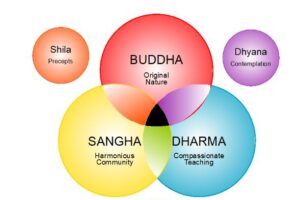
Some have made the well-meaning mistake of referring to myself, as well as to others who have attained the lofty position of Zen Priest, with the appellation, “Zen Master.” I have quickly corrected them as regards my case, at least, and want to encourage others to be careful in using this term. In Zen, as well as other areas of endeavor, one is not a master until recognized as such by others, and all opinions in this regard are definitely not equal. Usually, time will tell whether a given figure in the history of Zen was a true master. My assumptions include that such a person not only has some insight into the true meaning of buddha-dharma, but is also able to help others to come to that insight.
The traditional lineage of Soto Zen is, ostensibly, a record of such occurrences. In such cases of “dharma transmission,” the master is apparently able to intuit, and respond to, the condition of “ripeness” of the student, and at the right time to emit a word, grunt, or gesture that has a profound effect (“finger, pole, fist, whisk, staff or shout” from Master Dogen’s Fukanzazengi), triggering an awakening insight. This action on the part of the master is called a wato (C, hua to). That it has a specific name indicates that this has long been recognized as the signature act that distinguishes a true master of Zen from the run-of-the-mill teacher. Of course, there are many recorded instances of students having a delayed reaction, under the guidance of another master, notably Ananda, who awakened under Kasyapa, after Shakyamuni’s death.
Nobody can master Zen. Zen masters us.
zenkai taiun michael elliston, roshi
ARTS
Ordinarily, however, mastery connotes something other than this extreme level of intuitive skillful means, but is always based on some form of “been-there-done-that” experience. In everyday parlance, it usually denotes the level of ability of a person to manipulate a medium, for example in the plastic arts such as painting; or the body and other instruments in performance arts such as dance, theater, music, or sports; or within a realm of pure or applied conceptual thinking, such science and engineering, requiring a high degree of competency in the intricacies of math, mechanics, physics, and so on. We witness, and marvel at, many examples of this type of mastery, to which we are constantly exposed, these days, through the vastly expanded venues of the Internet, as well as the now-traditional channels of radio, television and film.
GAMES
Then there are other categories, such as that of board games, in which, like sports, one can rise to varying degrees of recognition as a master, or even grandmaster. Chess and bridge spring to mind, but there are others less familiar, such as the game of Go, and perhaps dominoes and mahjong. As with most areas of human endeavor, there are cultural hierarchies, levels of respect accorded to not only the masters of the games, but even rankings of the games themselves. Chess, for example, is commonly regarded as a transcendently higher degree of difficulty than is checkers.
Magister Ludi, which means “master of the game,” a futuristic fictional novel by Hermann Hesse, elevates the mastery of a fictional game, called the “bead game” to an even more transcendental level. Without attempting to capture Hesse’s thesis, in brief, the meaning, and consequently the playing, of the “bead game,” transcend the bounds of mere entertainment or intellectual prowess, incorporating themes from vast areas of human knowledge as lines of development in an abstract interplay. In the evolution of the game, it began with employing actual beads, but as of the timing of the story, no longer relied on them to play the game. This implies some sort of advanced technology, perhaps anticipating the computer-based gaming ubiquitous today.
POLITICS, WINNERS & LOSERS
Then again, there is what we might call political mastery, in which the stakes can be very high, ultimately even controlling, or at least affecting, the destiny of whole peoples — and, by extension, the entire human world — via war games, for example.
Winning the larger game of life is usually measured in terms of acquisition of wealth, or its doppelganger, power. This is one of the most troubling memes vexing Western society today — that there are always, necessarily, winners and losers to every transaction.
The usual approach to mastering any or all of these games implies a dominating, even forceful, imposition of one’s will on the structure of the game in question, and the requirement that one vanquish any opponents contesting one’s mastery. It also suggests a certain degree of deception, playing one’s cards close to the vest. But mastery in Zen is another matter.
ZEN
Nobody can master Zen. Zen masters us. This may also be said of the other games, arts and sciences noted above, in that true mastery would require some sort of surrender, or submission, to the medium or discipline, in order to master the intricacies of the activity. And deception is anathema to either its practice or its transmission.
Zen begins with, or began with, surrender — in Buddha’s sitting down in meditation under the Bodhi tree, resolving to die if need be to solve the fundamental koan of existence, which he clearly saw to be of the nature of suffering, or universal change, in life. If we are to believe the story, he had tried all of the various approaches to mastering life that were available to him in the culture of that time, and none had worked. Or we might say that he had mastered every teaching that anyone had to offer, but none completely assuaged the suffering that he felt so keenly, both for himself and for others.
If we were to conceive of mastery in Zen, instead, as entailing the conquering of life and death — in the sense that through Buddhist awakening, one might be able to escape the inevitability of aging, sickness and death — Zen would be reduced to nothing other than another hopeful avoidance technique, promulgating a philosophy of evasion of truth, or reality. It would take its place in the pantheon of such religious and philosophical belief systems as sell the wine of delusion, in the form of a promise of eternal life for the individual soul, or self. Buddhism insists upon the fallacious nature of this premise, and laments its widespread acceptance. This particular meme is seen as the source of much unnecessary suffering in the world.
While the fantasy that this person will survive death intact can be said to alleviate the suffering of anxiety that arises when facing existential uncertainty, the belief that the soul will survive somehow leads many to waste the precious opportunity that human birth represents in Buddhism. In Zen, and Buddhism in general, human beings are not seen as the masters of the world, but an integral part of it. And certainly, no ethnic group is seen as the “master race,” if you will permit me the use of that self-contradictory term.
SELF
What it is, if anything, that we can master, in Zen, is the predominance of the so-called self, which exerts its influence over our behavior through the natural survival mechanism of the discriminating mind. This “monkey” mind is intricately and inextricably connected to the appetites of the body, and will lobby on their behalf, in spite of all our good intentions to the contrary. Most of our issues with health and happiness revolve around the conflict between what we want to do and what we should do, which are all too often not the same. Happy are those who want to do what they have to do, or need to do.
In the Repentance verse that we often chant in Zen liturgy, the expression “born of this body, mouth and mind,” reflects this reality. Most of our desires, urges, cravings and motives derive from the nature of the human being, with its roots in the carnal nature of the body. They are reinforced by the actions of the mind, and, with its powers of imagined fantasy, enlarged and enhanced into irresistible attractions. This is the so-called clinging mind, which divides sentient being into five skandhas — form, sensation, perception, impulse, and consciousness — all of which are seen to be, and labeled, “aggregates of clinging.” The mouth contributes taste buds and inconsiderate speech.
We aspire to something higher. We want to regard human nature as transcendental. All of the great religions, philosophies, and accomplishments of art and science point to, and are examples of, this aspiration. But human nature is just, and only, what it is. In Buddhism, it is more correct to name this potential nature buddha-nature, recognizing and honestly assessing the limitations of human existence. Human nature embraces a vast spectrum of behaviors and world views, many, or even most of which, are contrary to this aspiration.
From this realistic perspective, balancing the optimism of aspiration with the pessimism of what we witness daily, it becomes clear what it is that we have to master. We can fob off the excesses and outright evil-doing in the world — onto differing causes and conditions, nature and nurture, and other theories of human behavior — with such cavalier attitudes as “There but for the grace of God go I.” But this does not relieve us of the necessity of examining our own, perhaps privileged, perch, from which we are casting aspersions on others. We may need to take a real good look in that Zen mirror.
PROBLEM
To solve a problem, one must recognize that there is a problem, goes the saying. However, there is the next step of problem definition that is crucial to any real solution. If we define the problem of existence in such a way that it is to be found in the behavior of others, we are essentially declaring that there is no real problem, at least not in our world. If all these troublemakers would only have the decency to cease and desist, or just go away, the problem itself would go away.
This attitude, or conclusion, is nothing more than the logical extension of belief in a self that is separate from others. Obviously, we are all different, but that does not make us separate. The Zen expression, “the most you can say is not-two,” captures this balance, of the one and the many. We do not assert that all are the same, in Zen, or that all is one. There is a kernel of truth in the latter expression, and it has a certain attraction, one that derives from its shock effect. To say that “all is one” challenges the conventional wisdom that all is certainly not. One, that is.
ONE & ALL
By being made to consider that all may be one, we have to set aside a prejudice for the opposite — that all are clearly opposed to each other, in fundamental ways. Which attitude is built into human nature (born of body, mouth and mind), based on the survival instinct, and relentlessly reinforced by societal norms and cultural memes. The air I breathe cannot be enjoyed by any other human or sentient being. My exhalation has to be recycled through the plant kingdom, to make oxygen available to others. Same for water, food, all the many other life-sustaining commodities we consume. When push comes to shove — you against me — I will endeavor to make sure that I am not the one to suffer. Which means it is going to be you.
This also means that we are, forever and inevitably, engaged in perpetual war. Not only war between nations, but between individuals, competing businesses and other groups, even our own families. Some accept this as survival of the fittest, and even welcome it. Especially when their assessment of the situation indicates that they have the upper hand.
AT THE END OF THE DAY
But Zen raises the unasked question: What is the long-term use of it? Suppose you won every battle you ever choose to engage during your lifetime. What real advantage do you gain, when all is said and done, or — in the gratingly overused expression of our times — “at the end of the day”? The end of the day usually in question, of course, is not really the end of the day. There is another day, and another, and another — until one’s tether finally runs out.
We may temporarily enjoy the game, of course. As a mentor of mine used to say, “What do you do ’til the doctor comes?” But the game always, finally, comes to an end. At least in this lifetime. So at the end of that day, are we really reduced to counting up our toys, measuring them for size, and concluding that we either “won” or “lost” the game?
What if mastery of life has nothing, really, to do with all that? What if we are simply settling for some great conventional booby prize, simply because everyone else seems to think “that’s all there is”? What real prize might we be missing out on, in our ignorance, distracted by our eagerness to pursue the American Dream?
We should “investigate this thoroughly in practice,” to steal a line from Master Dogen.









